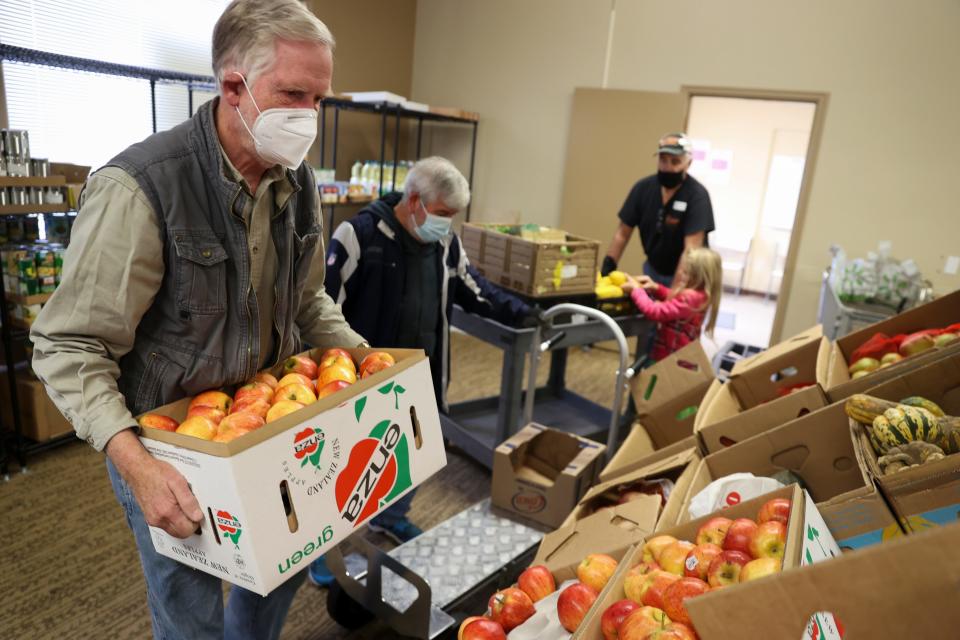Food bill would expand nutrition benefits to immigrant Oregonians

A bill introduced in the Oregon Legislature would provide food assistance to some 62,000 Oregonians who are ineligible for Supplemental Nutrition Assistance Program (SNAP) due to immigration status.
Senate Bill 610, called Food For All Oregonians, is backed by a coalition of more than 75 organizations across the state and sponsored by 17 lawmakers.
“Everyone in Oregon should have access to food, no matter where they were born,” chief sponsor Sen. Wlnsvey Campos, D-Aloha, said during a Tuesday news conference. “This bill is one of the most significant opportunities this session to make concrete improvements to the lives of Oregonians.”
Thousands excluded from SNAP still food insecure
The bill as introduced would create a program within the Department of Human Services that would mirror SNAP for people who would qualify for the program based on income, but are excluded because of their immigration status.
Some 62,000 people in Oregon fit that profile, according to the Oregon Food Bank. That’s roughly 40% of people across the state who report food insecurity, according to data from the Oregon Hunger Task Force. In Marion County, about 21% of people who report food insecurity do not qualify for SNAP benefits.
Those people include lawful permanent residents who have not yet been naturalized or have not been in the country long enough. They also include Deferred Action for Childhood Arrival (DACA) recipients, some refugees and asylum seekers, U.S. Compacts of Free Association (COFA) citizens, and undocumented immigrants.
Undocumented people are eligible for WIC benefits, school meals, food banks and Meals on Wheels. U.S.-born children also can access SNAP benefits. But fears and confusion about how applying for benefits might impact visa eligibility dissuades people from trying to access such benefits, Western Oregon University public health professor Megan Patton Patton-López told the Statesman Journal in 2021.

In Oregon, many of the families experiencing food insecurity are the same ones who put food on our tables, said Petrona Dominguez Francisco, program coordinator at Adelante Mujeres.
“Many families [facing food insecurity] are farmworkers or work in the fields,” Dominguez Francisco said. “They have a job that feeds all of us, but somehow forgets to nourish the same people who provide our everyday meals.”
The Department of Labor estimates 37% of farmworkers lack work authorization. Immigration status, combined with low wages and long working hours, make farmworkers especially vulnerable to food insecurity.
It’s also important that people have access to food that is both “nutritious and culturally familiar,” supporters of the bill said.
Dominguez Francisco said outreach to farmworker and Latinx communities reveals, repeatedly, that farmworker families feel like they get “second-hand” food at food banks and the food that no one else wanted, and there are few or no healthy choices.
“Our freedom, our health, our ability to thrive all depend on access to food that is nutritious and culturally familiar,” Campos said.
Managed by state, handled by communities
Supporters of the bill say it’s important to consider how the benefits are accessed. Some non-citizens may fear applying for governmental assistance; others may just not know how to do it.
SB 610 also includes funding for outreach through a community-based organization.
Such a model already exists, and successfully, said Aldo Solano, strategic partnership manager for Oregon Food Bank.
Solano referred to the the Worker Relief Fund, which has distributed hundreds of millions of dollars in financial aid to thousands of Oregon workers. The fund is unique in the way it is managed: money is provided by the state, but the program at-large is executed by a coalition of community-based organizations who “already have deep connections in their communities.”
It’s an example he hopes Food for All Oregonians follows. The program would be funded and managed by the Department of Human Services. But as written, at least some funding would be given to organizations across the state to do their own outreach. Those groups would be responsible for helping people apply for and access benefits.
The coalition backing the bill does not yet have a price tag on it, Solano said. A similar program in California budgeted $40 million to expand food assistance access to undocumented immigrants who are at least 55 years old.
Similar programs exist in other states, including Washington, Illinois, and Maine, but Solano said he hopes Oregon’s is “more comprehensive.”
“Others haven’t passed the full scope we’re trying to do here.”
The bill has been introduced and referred to the Senate Committee on Human Services and the Joint Committee on Ways and Means.
Shannon Sollitt covers agricultural workers through Report for America, a program that aims to support local journalism and democracy by reporting on under-covered issues and communities. Send tips, questions and comments to ssollitt@statesmanjournal.com
This article originally appeared on Salem Statesman Journal: Oregon food bill would extend nutrition benefits to immigrants

